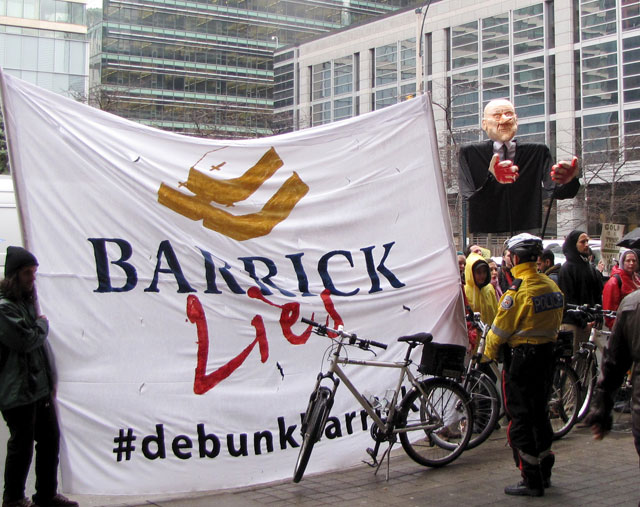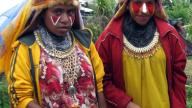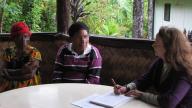For many years Papua New Guineans, with the support of MiningWatch Canada and other international organizations, have demanded that Barrick Gold acknowledge a long-standing pattern of vicious beatings, rapes and gang rapes of local indigenous women by security guards at the Porgera Joint Venture (PJV) mine, operated and 95% owned by Barrick. [1] After years of denial in the face of mounting evidence, Barrick finally acknowledged the rapes. In October 2012, Barrick started to implement a project-level non-judicial procedure to deal with hundreds of alleged victims of rape by the PJV mine’s security guards.[2]
In November, 2012, MiningWatch Canada was provided a copy of Barrick’s remedy framework (not by Barrick). The remedy framework raised serious concerns about the benefits package being offered to rape victims, which focuses on income generating projects,[3] the claims process itself, and the requirement that women who accept an individual benefits package must sign a legal waiver that precludes them from suing Barrick on the issues covered by the non-judicial process:
“the claimant agrees that she will not pursue or participate in any legal action against PJV, PRFA [Porgera Remediation Framework Association Inc.] or Barrick in or outside of PNG. PRFA and Barrick will be able to rely on the agreement as a bar to any legal proceedings which may be brought by the claimant in breach of the agreement.”
On May 14, 2013, 77 organizations from around the world sent a letter to the United Nations High Commissioner of Human Rights to protest the fact that rape victims will only receive individual benefit packages through Barrick’s non-judicial process if they grant Barrick legal immunity from future civil action. (Since the letter was sent, additional organizations have signed on. MiningWatch Canada will continue to update the sign-on list on our web site.)
Background
MiningWatch Canada has engaged with local Papua New Guinea organizations Akali Tange Association (ATA) and Porgera Landowners Association (PLOA) in Porgera over mining-related human rights and environmental issues since 2005. One of the issues that have been of serious concern has been the issue of the rapes of local women by mine security guards.
MiningWatch has supported the visits to Canada of leaders of ATA and PLOA between 2008-2011, and MiningWatch’s Catherine Coumans made two visits to Porgera, in 2008 and 2009. During one of these visits she interviewed rape victims. Findings resulting from these exchanges were made public in various ways including through public letters to UN Rapporteurs, press releases, background documents, a report to a Parliamentary committee, and in a complaint to Canada’s National Contact Point for the OECD Guidelines for Multinational Enterprises.
While Barrick’s recent acknowledgement of the rapes by mine security guards was a positive development, MiningWatch denounces Barrick’s use of a non-judicial process to secure legal immunity for the company from potential suits brought by the women.
In January, 2013, MiningWatch, together with Rights and Accountability in Development (RAID) and EarthRights International issued a press release and supporting documents protesting the fact that rape victims are being asked to sign away their right to legal recourse in return for a benefits package they may receive through Barrick’s non-judicial process. Barrick’s response was to publicly defend its requirement of a legal waiver, including on CBC Radio’s As It Happens.
In March, 2013, MiningWatch’s Catherine Coumans travelled to Porgera in Papua New Guinea to assess the claims process first hand. From March 5-10 she conducted interviews with alleged rape victims. Nine of these interviews were in depth, of which two were with women who had already entered Barrick’s claims process. She was also able to gather information on the experiences of other women in the claims process who she did not interview in depth. This field assessment of the claims process led to more detailed concerns regarding, among others, transparency of the process, the type of benefits that were being offered, the level of understanding of the process by women entering the process, and the requirement for legal waivers should a rape victim accept a benefits package. We have detailed these concerns in letters to the United Nations High Commissioner of Human Rights (UNHCHR) (March 19, April 2, and May 14, 2013), and has responded to Barrick’s own letters to UNHCHR and web postings in response to our concerns.
Barrick reacts to criticism
On April 16, Barrick announced on its web site that it had changed the language of the legal waiver: “Further, the language MWC [MiningWatch Canada] purports to quote from the model agreement derives from an early draft; the present version contains much narrower terms.”
In spite of repeated requests by MiningWatch, including at Barrick’s Annual General Meeting on April 24, Barrick did not provide a new text related to the legal waiver, eventually replying that this text was “undergoing final revisions.” On May 16, two days after the organizational sign on letter protesting Barrick’s legal waiver requirement had been sent to the UNHCHR, Barrick released a new text related to the legal waiver. The new text reads:
“The Claimant agrees that, she will not pursue any claim for compensation, or any civil legal action that relates to the event(s) giving rise to the remedy claim, against the Porgera Joint Venture, PRFA or Barrick in Papua New Guinea or in any other jurisdiction. This limitation expressly excludes any criminal action that may be brought by any relevant state, governmental or international regulatory entity.”
This new text deals with what was described to us by a Papua New Guinean human rights expert as legal and constitutional concerns regarding Barrick’s original legal waiver – stemming from the fact that the original text did not respect the Papua New Guinea state’s authority to bring criminal charges and call witnesses, which may include rape victims who have received a benefits package through Barrick’s non-judicial process.
The new text, however, still requires that rape victims who accept an individual benefits package through Barrick’s non-judicial process sign a legal waiver that grants Barrick legal immunity from law suits (civil suits) brought by the victims themselves.
Not “best practice”
In its letters to the UNHCHR (March 19, April 2), we provided examples of non-judicial remedy programs that explicitly do not require claimants to give up their rights to future legal action: in particular the Hokie Spirit Memorial Fund at Virginia Tech and victim’s compensation schemes in Australia that provide for the payment of compensation by the government to victims of serious crime, as assessed by an independent tribunal.
These schemes provide important and relevant principles. Both cases recognize that the awards provided through non-judicial schemes may not reflect the level of compensation to which victims may be entitled under common law.[4] This is also the case in regard to the remedy packages Barrick is offering rape victims in Porgera based on the information in the remedy framework document and interviews conducted by MiningWatch.[5] Furthermore, the Australian case provides another relevant principle, namely that compensation provided through a non-judicial mechanism may be made subject to a condition that the compensation be repaid from any subsequent award of damages in subsequent legal proceedings. This provision avoids so-called “double-dipping,” which Barrick originally claimed (on CBC) as a reason for requiring a legal waiver.
Conditioning remedy on securing immunity: What is at stake and where is John Ruggie?
The women who have endured brutal assaults, beatings, rape and gang rape by security guards at Barrick’s gold mine are overwhelmingly poor, marginalised and have low levels of formal education. The rapes have further marginalised and impoverished them. These women have suffered a gross violation of human rights.
Corporate project-level remedy processes do not have any legal status, do not necessarily afford victims the safeguards and protections of a court of law – such as independent legal counsel – and are not required to provide remedy that would be commensurate with what victims may receive through a legal process. They may also take place in very remote locations such as the Highlands of Papua New Guinea with little or no independent scrutiny. There is no global assurance system for the operation of these corporate non-judicial mechanisms.
Barrick claims that its non-judicial claims process conforms to the United Nations Guiding Principles on Business and Human Rights and references the primary author of the Guiding Principles, John Ruggie, in its remedy framework. John Ruggie is also a Special Consultant to Barrick’s Corporate Social Responsibility Advisory Board. We have demonstrated that Barrick’s claims process fails to meet the “effectiveness criteria” outlined in the Guiding Principles. Importantly, the Guiding Principles do not condone the use by a corporation of a non-judicial remedy process as a means to secure legal immunity for the company from future civil action by the victims. However, Ruggie has failed to speak out on this issue and has not responded to our questions as to his stance on Barrick’s conditioning of remedy on receiving legal immunity.
While MiningWatch believes that Barrick should offer compensation for the harm that has been caused by its security guards, there should be no conditionality attached to the offer of remedy. A remedy package should be offered to compensate for a harm that has been suffered; it should not be used as a transaction of value. The remedy process should not be used as a vehicle by which to secure legal immunity for Barrick Gold. Nor should Barrick’s non-judicial process for dealing with the rapes in Porgera be allowed to set an industry precedent.
[1] Leadership of the Akali Tange Association (a grass roots human rights organization in Porgera) and of the Porgera Landowners Association (which represents the landowners in the mine lease area) travelled yearly to Canada between 2008-2011 to meet with Canadian media, speak at Barrick’s annual general meetings and meet with Canadian civil servants and Members of Parliament regarding issues of violence by Barrick’s security forces at the Porgera Joint Venture mine. They also joined with MiningWatch Canada in lodging a formal complaint, in March of 2011- addressing the rapes among other issues – with Canada’s National Contact Point for the OECD Guidelines for Multinational Enterprises.
[2] In addition to victims of rape by the mine’s security guards, women also allege rape by police mobile units that are housed at the mine site, fed and supported financially by PJV. Barrick’s claims process will not provide benefits to women who have been raped by police mobile units.
[3] Benefits packages are described as “services and support to ensure the welfare and safety of Claimants, or to provide the Claimant with sustainable economic assistance,” as opposed to compensation or remedy, and may include: psychosocial/trauma counselling; health care; education and training; cooking utensils, clothing; micro-credit; assistance with school fees. For a complete list see Olgeti Meri Igat Raits: A Framework of remediation initiatives in response to violence against women in the Porgera Valley. Pages 11-12.
[4] Common law of PNG consists of the Constitution, “customary law” derived from the “custom” of the various peoples of Papua New Guinea, and the common law of England as it stood at the date of Papua New Guinea’s independence on 16 September 1975 (Wikipedia).
[5] Barrick’s letter to the UNHCHR of March 22 describes a “recent enhancement” to the company’s remedy program in Porgera notably that “it will bear in mind the range of awards that have been rendered in the Papua New Guinea civil justice system for rape and sexual assault.” It is unclear exactly what this will mean in practice.


